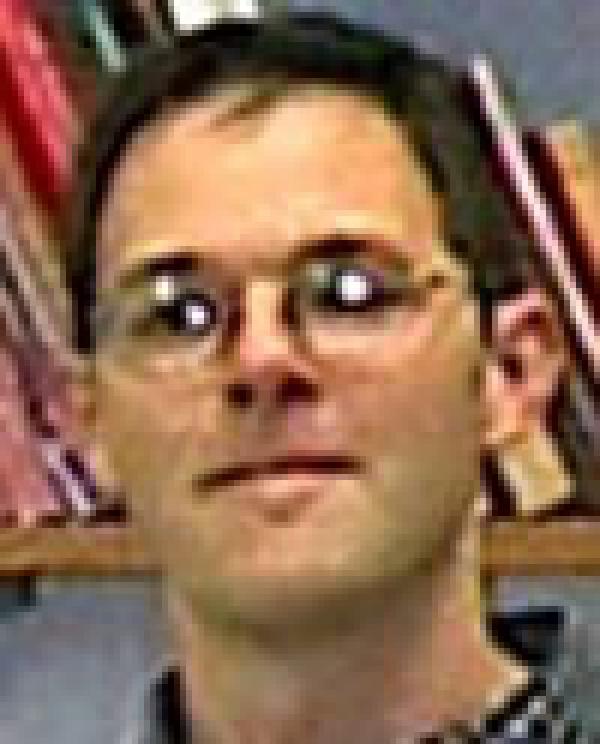Davis McCombs

Bio
Davis McCombs teaches in the Creative Writing Program at the University of Arkansas. His first book, Ultima Thule, was chosen by W. S. Merwin as the winner of the 1999 Yale Series of Younger Poets. Published in April 2000, it was selected as one of five finalists for the National Book Critics Circle Award.
He attended Harvard University, the University of Virginia, and Stanford University as Wallace Stegner Fellow in poetry. He is the recipient of fellowships from the Ruth Lilly Poetry Foundation, the Kentucky Arts Council, and the National Endowment for the Arts.
His work has appeared in The Best American Poetry 1996, The Missouri Review, Hayden's Ferry Review, as well as in many other journals and magazines.
Author's Statement
When I finished writing the poems in my first book, Ultima Thule, I had come to the end of an eight-year project. At the time I felt certain that I would not undertake another series of poems for my second book. Writing another book of interrelated pieces was the farthest thing from my mind. I wanted discrete poems, poems that stood on their own. All this I proclaimed loudly, more than once in print.
I should have known by then, of course, that whenever I make such pronouncements about poetry, about what I will and will not do, or the types of poems I am going to write, I always find myself, some time later, coming-to under my desk.
Now, despite all my intentions and proclamations, I find myself in the middle of writing another project, this time about white burley tobacco farming in South Central Kentucky where I grew up. Though not of the scope of my "cave poems" (surely it won't take eight years this time), the tobacco poems, I feel certain, will form a significant part of my second manuscript. Without my NEA grant and the two teaching-free summers it is allowing me, I would never have been able to take on another long sequence.
The way I feel about the tobacco poems now is similar to the way I felt about the cave poems while I was writing them. I am certain that the poems are important, that they must be written, but what keeps me up at night is the worry that I'm not up to the task, that I can't make the poems as good as they should be, as they deserve to be. With the help of the NEA, I can now devote myself fully to writing them. Only in that way do I have any hope of writing half the book I want.
Ultima Thule (excerpt)
**Stephen Bishop was the slave of Dr. John Croghan, owner of Kentucky's Mammoth Cave from 1839-1849. Bishop served as a guide at the cave from 1839 until 1857. His daring explorations, which led to the discovery of miles of cave passageways, were covered in newspapers and books. His fame drew visitors from all over the world. By smoking their names onto the walls of the cave, he learned to read and write. Stephen Bishop died in 1857 at the age of 37. Oddly, the cause of his death was not recorded and remains unknown.
Candlewriting
Childhood was a maples country, a rough
terrain of sinks and outcrops. Not once
did I suspect the earth was hollow, lost
as I was among the fields and shanties.
I remember the wind and how the sounds
it carried were my name, meant me, Stephen...
called out over the cornfield where I hid.
There was no sound when candlesmoke
met limestone - just this: seven characters
I learned to write with a taper on a stick.
What have they to do with that boy in the weeds?
Am I letters or the hand that made them?
A word I answer to and turn from, or the flame
that holds the shadows, for a time at least, at bay.
Star Chamber
Once, the Doctor spoke to me at length
of stars and prognostications, how,
when we observe the waxing of the Moon,
everything cognate to her nature-marrow
in bones and in trees, flesh of the river
mussel-increases also. He told of tides
and how the ocean is affixed as with a chain
to moonlight. I think it must be different
in the Cave, where no light penetrates.
There, I have lost hours, who cycles of the Sun.
At Star Chamber, I control the spheres-
a lantern hung just-so will produce the night sky
as if seen from a gorge; wobble it, and a comet,
smoky, pestilent, streaks across the Ether.
Visitations
There came to us, Tuesday last, a man
of most peculiar visage. The Doctor,
to whom we turned for insight, muttered
of abominations, dismissed our questions.
And yet I did not hesitate to show the Gentleman
as far in the Cave as his leisure and his pocket
would allow. For, there, to the faltering
glow of a greaselamp or candle, throng
shadows far more monstrous than he.
These I do not fear. It is the women
on the tours that give me pause, delicate,
ghost-white, how, that night, I'm told,
they wake to find themselves in unfamiliar
beds, and lost, bewildered, call my name.

